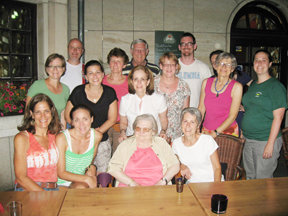After the German military invaded the Soviet Union in June 1941, the family of siblings Joseph and Joan Bonder was never the same. The family had already endured the 1939 Russian occupation of their native village of Faszczowka, Poland, but was about to face a far worse tragedy.
The year after Hitler’s army arrived, the Bonder family – Joseph, Joan, and their parents – were ordered to move to Skalat, a Jewish ghetto. The elder Bonders knew what was coming next and, in an effort to save their children, told them to go to the home of their former neighbors, the Firutas, who they called “good people who will help you.”
And help they did.
From 1942 until 1944, when the Soviets liberated Poland, Bronislaw Firuta and his family, who were non-Jews, hid young Joseph and Joan in their home and barn.
“They chose to act when so many other people didn’t.” – Kristen Lefebvre
________
Last year, The New York City-based Jewish Foundation for the Righteous reunited Joseph Bonder, who now lives in New Jersey, with Bronislaw Firuta, who still calls Poland home.
“One of the most interesting things about rescue and the rescues during the Holocaust, is that for the most part the rescuers were ordinary people,” said Kristen Lefebvre, the foundation’s newly appointed senior program associate and a Hoboken resident.”They came from all different backgrounds, all education levels, and there’s not one specific thing that they all had in common other than that they cared enough to help people who were in need. They chose to act when so many other people didn’t.”
‘Always been an interest’
The Jewish Foundation for the Righteous, Lefebvre noted, has two purposes.
It works to provide financial support for non-Jews who hid and safeguarded Jews during the Holocaust, often risking their own lives in the process. As a part of this work, the foundation hosts annual reunions, like the one last year between Bonder and Firuta, between Jewish Holocaust survivors and their non-Jewish rescuers.
But the foundation’s core work – helping educators acquire the skills and materials they need to teach secondary school students about World War II history and the Holocaust – resonated with Lefebvre when she was a student herself.
“Holocaust history and studies have always been something that’s always been an interest of mine,” she said. “My father was in the U.S. Air Force, and when I was younger my family was stationed in Germany. My parents really took advantage of the fact that we were there and wanted us to learn about the history. One of the places I remember them taking my siblings and me to was Dachau, the concentration camp. Even though I was in middle school at the time, of all the places we had gone to, that was really the one place that stuck out in my mind. Being there, and learning a little bit about what happened there, it made me want to learn more.”
The visit to Dachau – where at least 200,000 people had been imprisoned and more than 30,000 died – sparked an interest that would continue into Lefebvre’s post-secondary education, and beyond.
As an undergraduate at Bates College she studied World War II in more depth and did her undergraduate thesis on Holocaust history. After graduation, Lefebvre worked in education for a few years before returning to school to get a Master’s Degree from Tufts University in history and museum studies.
In her new position, Lefebvre now helps run the foundation’s educational programming, which periodically includes oral history instruction from both Holocaust survivors and non-Jewish rescuers – populations who are now aging and who likely will not be around much longer to offer first-hand testimony of the World War II period.
“Actually hearing from the people that experienced it, whether they were survivors or rescuers or liberators, that’s something we place a lot of importance on,” Lefebvre said.
E-mail E. Assata Wright at awright@hudsonreporter.com.
